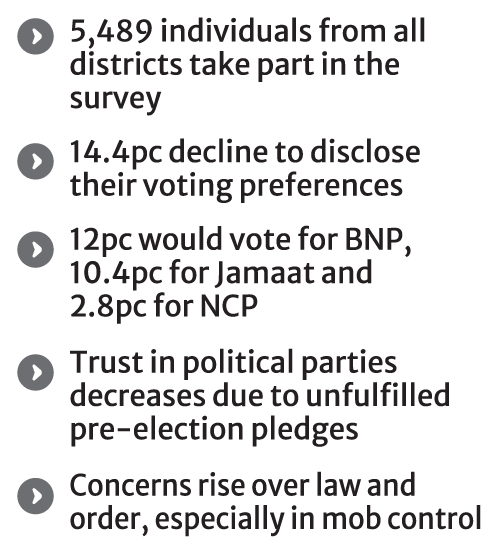
Published :
Updated :

More than 48.5 per cent of people have not yet decided whom they would vote for in the next parliamentary election, according to a latest survey conducted by BRAC Institute of Governance and Development (BIGD), BRAC University in July.
Besides, nearly 14.4 per cent of respondents declined to reveal their voting preferences, according to the survey titled 'Pulse Survey: July 2025 - Citizens' Perceptions, Expectations, and Experiences'. The findings were shared at a meet-the-press event organised by the BIGD and the citizens' platform 'Voice for Reform' at National Archives Auditorium in the city's Agargaon area on Monday.
The survey was the third edition of the same series following two previous pulse surveys on the same topic done in August and October last year. Data was collected from 5,489 individuals comprising 53 per cent male and 47 per cent female respondents from all districts between July 1 and July 20.

Fellow of Practice and Head of the Governance and Politics Cluster at the BIGD Syeda Salina Aziz presented the survey findings.
The event began with the unveiling of the cover of 'Diaries of Red July'. Voice for Reform Co-convener A.K.M Fahim Mashroor moderated the panel discussion, which included BIGD Adviser on Governance and Politics and Senior Research Fellow Mirza M. Hassan and Dhaka University Professor at the Department of Development Studies Dr. Asif M. Shahan.
The latest survey also revealed that the number of indecisive voters have increased as 38 per cent of the respondents were not decisive in the October 2024 survey.
Of the respondents, who have already made the decision, 12 per cent would vote for BNP, 10.4 per cent for Jamaat-e-Islami and 2.8 per cent for NCP.
A slight improvement was observed in public perception of the country's economic direction, with 45 per cent of respondents believing that the country is on the right path, compared to 43 per cent in October 2024.
According to the survey, a majority or 51 per cent of people said they want necessary reforms to be completed before the next national election. Another 17 per cent opined for conducting some urgent reforms before the election, whereas 14 per cent said it is better to hold elections putting aside the reform activities.
Some 70 per cent of the respondents said they believe the upcoming national elections would be free and fair, while 15 per cent thought the opposite.
Speaking on the occasion, Mirza M. Hassan said unlike in the past, it is seen that when the prices of daily necessities are affordable, people pay attention to law and order and other issues. Concerns about the law and order situation have grown, especially regarding mob control, he added.
Dr Asif M Shahan said people want reforms from their own experience. The desired reforms have not been implemented in the police, economy and education sectors, he said, adding that trust in political parties has decreased because the promises made before the elections are not being implemented later.
saif.febd@gmail.com


 For all latest news, follow The Financial Express Google News channel.
For all latest news, follow The Financial Express Google News channel.